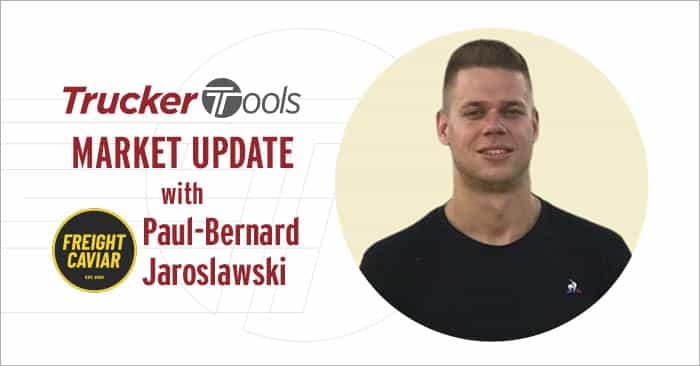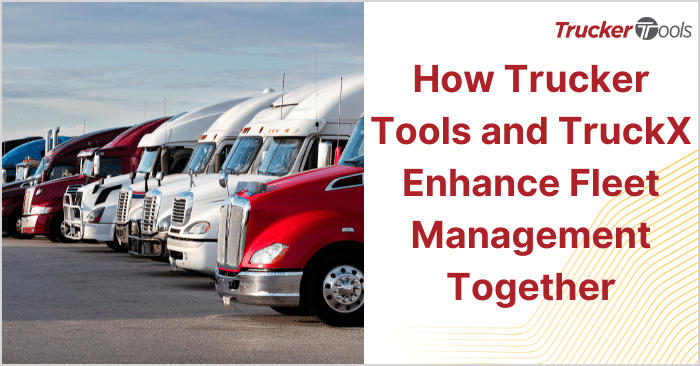We love speaking with folks from across the transportation industry, from owner-operators, company drivers and fleet managers to freight brokers, 3PLs and logistics consultants. We recently had the pleasure of talking with meme-maker extraordinaire and Freight Caviar host Paul-Bernard Jaroslawski. Jaroslawski’s Freight Caviar podcast brings together dispatchers, truckers and brokers to discuss logistics outsourcing and freight technology. In addition to his work with Freight Caviar, Jaroslawki currently serves as W/:\RP’s Head of Content Marketing and is a contributing writer for FreightWaves.
In our conversation with Jaroslawki, we asked him about his background in logistics, logistics outsourcing and the current state of freight markets here in the United States — all of which we share with you here.
From Chicago to
Ukraine
Jaroslawki grew up in a Polish family in Chicago, graduating from the University of Illinois in 2015. After he finished college, one of his fraternity brothers convinced him to come to work for his father’s company, Trek Freight Services, based out of Winwood, Ill., which was just recently acquired by Becker Logistics. After working with Trek Freight Services for a year, Jaroslawki was recruited to work for Everest Transportation Systems based out of Evans, Ill. The leadership at the company at the time was considering opening an outsourced freight brokerage office in Ukraine.
“I always thought there was an opportunity to outsource more to Eastern Europe and especially with my Polish background,” Jaroslawki said. “Everest began to grow very quickly after landing a few big customers. About a year in with them, the owners asked me if I wanted to move to Ukraine and manage their team there. I moved to Ukraine in November of 2017 and when I got there, there were four of us in the office. It was me, a tracker, one account manager and a sales rep. From there, we just started growing really quickly because the labor costs were very low. I was in Ukraine for exactly three years running the office. When the war broke out in February and we had to leave, our team had grown to more than 100.”
“I always thought there was an opportunity to outsource more to Eastern Europe and especially with my Polish background,” Jaroslawki said. “Everest began to grow very quickly after landing a few big customers. About a year in with them, the owners asked me if I wanted to move to Ukraine and manage their team there. I moved to Ukraine in November of 2017 and when I got there, there were four of us in the office. It was me, a tracker, one account manager and a sales rep. From there, we just started growing really quickly because the labor costs were very low. I was in Ukraine for exactly three years running the office. When the war broke out in February and we had to leave, our team had grown to more than 100.”
Today, Jaroslawki lives in Poland where he works for Los Angeles-based company W/:\RP, a self-described middle-mile logistics company, as its Head of Content Marketing in addition to recording podcasts for Freight Caviar.
The Current State of
Freight Markets and Brokerage
“It’s definitely flipped in the spot market,” said Jaroslawki. “It’s definitely a shipper’s market and shippers do have an advantage. Over the last few years, it’s been easier for freight brokers to move shipments compared to what it was previously. I think the worst thing right now is diesel costs, inflation and food costs. Essentially the market’s not that bad, but the rates have really gone down to the point where it doesn’t make sense to potentially be hauling some loads. If you were to compare the rate per mile from where it was in 2019 or 2018, it could be even higher than it was then, but diesel costs are three or four times as high. Inflation and the high costs of everyday goods really create a lot of pressure.”
Jaroslawki sees freight brokers and 3PLs as remaining somewhat insulated from inflation since they don’t typically have to deal with high overhead like carriers do. He does think that if there is a recession, it may weed out some of the freight brokers and 3PLs that may not have the right relationships in place. According to Jaroslawki, a recession also would challenge some brokers to change their mindsets and work harder to provide the best customer and carrier experiences possible when the money isn’t flowing in as steadily.
Carrier Relationships
and Efficiency-Boosting Tech: Keys to Success
“There’s always been a pretty sour relationship between freight brokers and trucking companies,” said Jaroslawki. “There’s obviously a lot of companies out there that do a great job with that, but not all. Whatever size brokerage you are, if you focus on the trucking side where you actually make sure that truckers get paid on time, make sure that their detention requests are accepted and paid for, if you work on that experience, it’s going to be extremely beneficial when the hot market comes back. Customers are going to see the difference between you and your competitors potentially. As a freight broker, you have to make sure that you help trucking companies out as much as you can and that they’re satisfied with the way you operate. That can be very powerful and it has a compounding effect. First of all, it’s good morals to treat carriers right, and second is that it’ll help your business down the line.”
Jaroslawki also said that it’s important for freight brokers and logistics providers to have the right technology in place to create efficiencies and satisfy customers for the long-term. That should include technology to track loads and communicate effectively with shippers. He stressed the importance of using technology that provides shippers and trucking companies with a better experience. Driver and carrier-facing technology always should make the lives of dispatchers and drivers easier, according to Jaroslawki.
To learn more about Freight Caviar, visit https://www.freightcaviar.com/.






